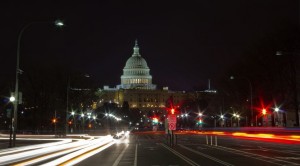On the Hill: The Religious Freedom Issue Congress Should Be Focused On

President Trump and his religious right allies in Congress are at it again, attacking the Johnson Amendment in another attempt to weaken the wall of separation between church and state and the integrity of our election process. While there are numerous bills that seek to repeal the amendment, such as the Free Speech Fairness Act, and executive orders seeking to weaken the bill, such as the one Trump issued earlier this year, the biggest blow to the amendment may come through the appropriations process.
Last week the US House Committee on Rules set the guidelines for consideration of a bill before the House of Representatives that would gut the amendment. The Financial Services and General Government appropriations bill has now been rolled into a big spending package called a megabus, and will be taken up by the House and (with a few changes) by the Senate. There is a section within this bill, Section 116, which Emily Cadei of Newsweek notes “would block funding to the IRS for carrying out investigations of churches suspected of breaking the no-campaigning rules, unless such probes are approved by the IRS commissioner and Congress is notified. After approval, the IRS would be able to launch an inquiry only several months later.”
But instead of spending their time on this “religious freedom” bill, which would really just allow churches to become political campaigners with the ability to receive tax deductible political funds anonymously, Congress should instead focus on H.Res. 349, a resolution designed to protect religious minorities by encouraging the repeal of blasphemy laws around the world.
The American Humanist Association worked with Reps. Jamie Raskin (D-MD), Alex Mooney (R-WV), David Cicilline (D-RI), and John Culberson (R-TX) to reintroduce the legislation, which calls for a repeal of blasphemy laws worldwide. Introduced in the last session of Congress by Reps. Joseph Pitts (R-PA) and Sheila Jackson Lee (D-TX), the legislation encourages the president and the State Department to make the worldwide repeal of these laws a priority, while also opposing any attempts to support blasphemy laws at the United Nations.
In many countries, Christians, Jews, Muslims, Hindus, non-theists, and other religious minorities are imprisoned, tortured, sentenced to death, and executed for blasphemy offenses. The resolution urges countries that still maintain such laws to “amend or repeal such laws, as they provide a pretext and impunity for vigilante violence against religious minorities.” The resolution also notes that blasphemy laws put thousands of lives at risk, with many offenders serving long jail sentences or being executed for “insulting” a specific religion.
So, while some religious right leaders want to see the Johnson Amendment repealed, most religious communities oppose such an action and would rather Congress focus on true religious freedom issues, such as the ability to practice or not practice a particular faith free from threats of violence or oppression. Choosing to take up this resolution, while allowing the Johnson amendment to remain in place (and while still allowing churches who want to participate in campaign politics to do so by giving up their voluntary 501c3 status) would be a sign that Congress truly cares about our Constitution and the religious freedom rights of all citizens, not just those who ascribe to a particular faith.
